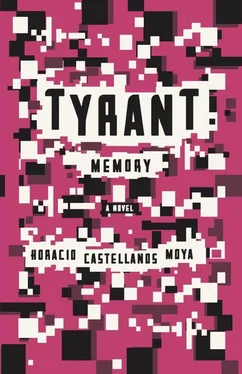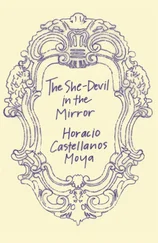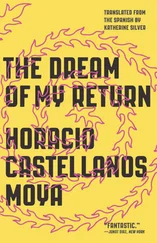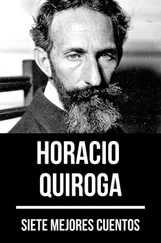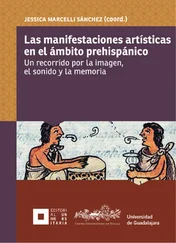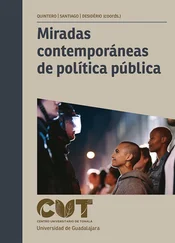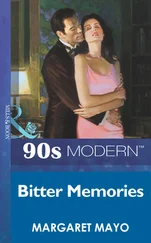Carmela insisted that the best thing for Old Man Pericles to do after the treatment was to go to San Jose, where his two children were living, so he could spend his last few months with has family. I was certain he would never take that comfortable and predictable route; nothing would have horrified him more than to watch his privacy suddenly intruded upon by his children and grandchildren and their concerns: he didn’t have the temperament of a patient, much less of a dying man.
Of his two remaining children, Pati was most like Old Man Pericles: she was a tall, graceful, haughty brunette; she had a fiery temperament and no time for trivialities. Married to a powerful Costa Rican communist, she had a couple of children and had made her home in that city, where Haydée had spent long stretches, especially toward the end, when the cancer was ravaging her. Old Man Pericles always called his daughter’s house “the Costa Rican rearguard,” because that’s where he went into exile each time the baboon currently in charge gave the order. I met Pati when she was little: she always was a livewire; then I heard about her marriage and didn’t see her again until her mother’s funeral.
“What are you painting, Chelón?” he asked me while Carmela was making coffee in the kitchen.
“I’m still on the fallen angels,” I answered.
“You’ve spent more than two years on them,” he said. “Have you found your gold mine?”
“The buyers like them, and they still aren’t boring me,” I explained, which was absolutely honest; every week I painted one oil and one watercolor of an angel with a different occupation, and they came to me on their own, without much effort. “As far as it being a gold mine, not. ”
“He’s now painting one where a poor ice-cream vendor, with his wings and dripping with sweat under the burning sun, is pushing his little cart,” Carmela said from the kitchen. “He modeled it after the ice-cream vendor’s cart that parks here at the entrance to the park on Sundays.”
“Not only the cart,” I said, “the hat as well.”
“It’s a source of solace,” Old Man Pericles said as he lit his cigarette.
“What do you mean?” Carmela asked, walking toward us with the coffee pot.
But I understood right away.
“People like to buy solace, the rich most of all,” he answered.
“There you go with your notions,” I said. “The poor are the ones who need solace.”
“But they don’t have the means to buy it. ”
“The Italian ambassador already reserved the ice-cream angel,” Carmela said, pleased, while she poured out the coffee.
He was one of those boors who begin to fancy themselves renaissance men after being posted to a backward country like ours. When I described to him what I was painting, he said he loved ice cream and asked me to put it aside for him, and he even had the nerve to offer me some suggestions. He’d been at the house the previous Saturday, insisting we come to a reception at the embassy; he appeared incapable of comprehending that his world was so alien to me that his offer to send his chauffeur would do nothing to induce us to attend his party — we had already had our share of protocol for our lifetimes.
“He brought me some first-rate cigars,” I said, remembering the Italian’s good side. “Would you like one?”
“Of course. I hope such high quality doesn’t irritate my taste buds. ” Old Man Pericles said, ironically, for he smoked the cheapest cigarettes around.
“What they’ll irritate are your lungs,” Carmela cut in, glaring at me reproachfully for what she considered to be my imprudence, as if she still didn’t want to accept that there was no return, our friend had already crossed the line, his refusal to submit to the treatment was not a mere whim, not a reaction to fear, but rather the result of a final, resounding decision — and Old Man Pericles had always been a decisive man.
I went to the studio to get the box of cigars off the bookshelf.
We rarely spoke about politics, only when there was pandemonium in the streets due to strikes, elections, or a coup d’état. Old Man Pericles always had the latest bits of gossip, but he doled them out slowly as if they were old jokes everybody had already heard. Already before Haydée’s death his tone had become sardonic, even when he talked about his own comrades’ adventures, as if he no longer believed what he preached and belonged to that gang because one has to have something to cling to in this life. He despised the military even though he, his father, and his grandfather had been in the military; more than anything, though, he despised the rich: the fourteen packs of hyenas, he called the so-called fourteen families who own this parcel of land. It was his loathing of the arrogance of the powerful that made him remain a communist to the very end rather than any illusion about the supposed goodness of that other world. “There’s deep shit everywhere, Chelón. This is mine. What is to be done?” he said one day after returning from a long trip to Moscow and Peking, when those two cities were still on friendly terms.
At some point in the afternoon he’d always enter my studio: he would cast an eye over the canvas I was painting, rummage through my books with the hope that I had bought something that might interest him, then look pensively out the picture window. He never offered an opinion about my paintings, always claiming to be incapable of evaluating the visual arts; he was contemptuous of non-figurative art and was grateful I had never wasted my paint on such things. Whenever I showed him any of my poems, published or not, he’d make a measured comment, but would always end by saying: “You’re right to prefer painting.” That was another of his characteristics: he seemed to go through life forgiving the world. I reminded him of it that afternoon when I noticed him looking attentively at the ice-cream vendor as a fallen angel:
“What is His Lordship’s judgment?” I asked in a sarcastic tone, much like his own, as I handed him a cigar.
“You should give the ice-cream vendor the Italian ambassador’s mug,” he said.
Then he stood looking out the window in intent contemplation, as if he didn’t want to miss a single detail. He asked me for the binoculars. I told him I’d lent them to Ricardito, and he still hadn’t returned them. He looked at me as one looks at a man who has been swindled despite the warnings.
“And that girl, Andrea, has she returned?” he asked me in the conspiratorial tone of an accomplice, because I had told him about the visits of the young lady who wanted to sit for me, of Carmela’s chagrin, of the fantasies and fears that even old age fails to temper.
I said no without parting my lips, only waving my index finger back and forth.
Carmela appeared in the doorway.
Now, while reminiscing, I realize that ours was, more than anything else, a friendship of old age. We had, of course, met in the twenties, and the friendship between Carmela and Haydée had been indissoluble since they were children, but for the following thirty years we’d seen each other only sporadically while his and Haydée’s lives were swept up in the old man’s political adventures — their periods in exile and the displacements — and Carmela and I went to live in the United States, where we remained for ten years, at first thanks to an arts scholarship and then as the embassy’s cultural attaché. The same baboon who put Old Man Pericles behind bars on more than once occasion was the one I had to thank for my appointment, which allowed me to live for several memorable years in Washington and New York. In 1958, when we returned home to stay, our friendship solidified, despite the constant turmoil of his political life, and Haydée’s cancer, which finished her off a few years later.
Читать дальше
